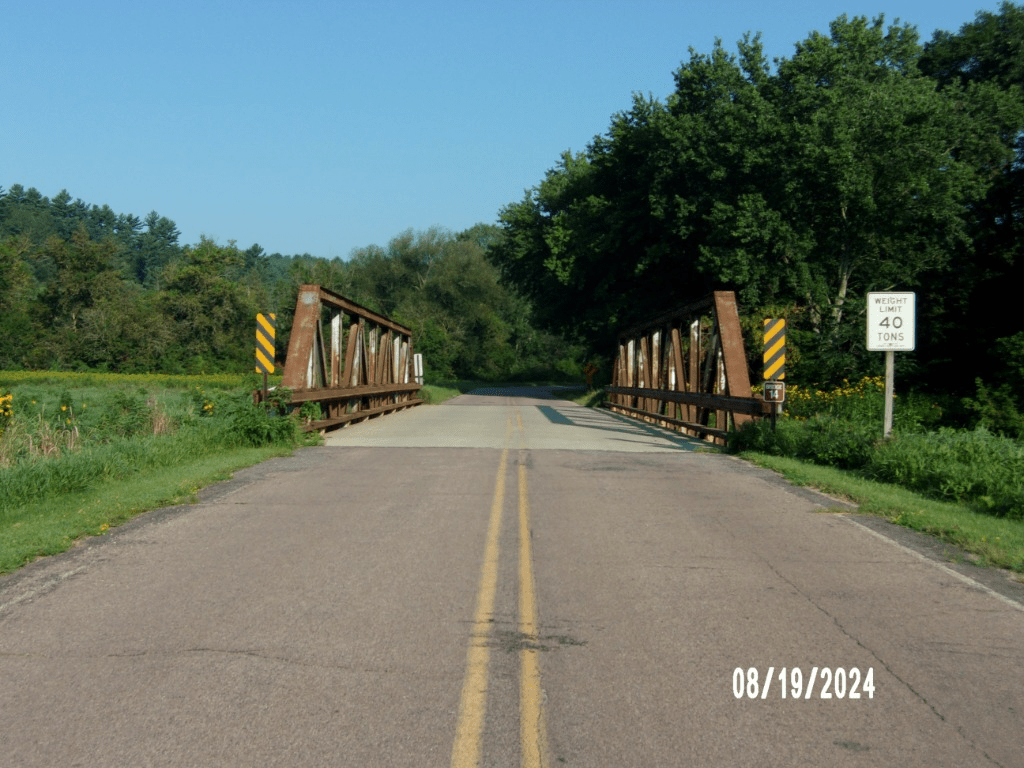Public Parks
Historic Sites
Wildlife and waterfowl refuges
Recreation areas
What are Section 4(f) properties?
This is the year that the National Historic Preservation Act was signed into law.
What is 1966?
This is the final step in officially submitting your Section 106 to WisDOT CRT for their review.
What is send an email to CRT?
If you have this in your project area, assume it is eligible.
What is a truss bridge?
This is the amount of ROW/Disturbance that you must be under in order to qualify for archaeology screening.
What is .5 acres?
It is this type of historic resource.
What is a truss bridge?
This is the person who must concur that the project will not adversely affect the activities, features, or attributes qualifying a park, recreation area, or wildlife or waterfowl refuge for protection under Section 4(f) before FHWA approves a de minimis impact
Who is the Official with Jurisdiction
The National Historic Preservation Act established the nation's first comprehensive preservation law, which created among other things - the National Register for Historic Places, the Section 106 process, and this important role of the Section 106 consultation partner.
What is SHPOs and THPOs?
What is the PM or the REC?
These are regional institutions that are the essential for consultation when an effect is identified as part of the 106 process.
This is the year that the most current DT1030 is from (and what you should be using to submit all your screenings).
What is 2023?
Yes, you must coordinate with WisDOT CRT staff if there are any of these to your project activities!!! No matter if its a signed 106 or a project that is already on the screening list.
What are project activity changes/amendments?
23 CFR 774 are regulations that aim to protect the use of this type of property
There are these many criteria for listing a property in the National Register.
"What is 4?"
Criterion A: History
Criterion B: Significant Person
Criterion C: Architecture/Engineering
Criterion D: Archaeology/Future Information
This is the correct Project Decision if there are no identified historic properties but there is a burial in your APE.
This is where the statement for 4(f) finding is for the NEPA Document.
This is what to do if your project is on the screening list, but a THPO responds to the notification letter and requests a copy of the archaeological survey.
Aside from FHWA, this is one of the two other federal agencies that are included in the WisDOT Section 106 PA. (you only need to name one).
What is FRA?
Or
What is USACE?
A Section 106 adverse effect to a National Register-eligible bridge will require a Programmatic Section 4(f) Evaluation and Approval for FHWA Projects that Necessitate the Use of Historic Bridges. If the bridge is to be demolished, advertisement of the bridge for reuse must occur unless this is approved by FHWA.
What is a bridge waiver?
The NHPA classifies listings by various types of properties. Listed properties generally fall into one of five categories:
1. Building
2. Historic District
3. Site
4. Structure
5.???
What is Object?
This is the year the updated Section 106 Programmatic Agreement was signed.
What is 2023?
This is the type of effect document that requires a Section 106 submittal prior to sending to WisDOT CRT.
What is adverse effect documentation?
or
What is MOA/D for C?
This resource in your project area prevents you from qualify for the screening list, but does not always require a full archaeology survey.
What is a burial site?
This is how long Katie Kaliszewski has been working for WisDOT.
What is 5 years?
When is a cemetery a Section 4(f) property?
1)All cemeteries are 4(f) all the time.
2)When it’s a historic property
3)When it's operated by a religious organization.
What is 'When it is a historic property.'
This is where Section 106 of the NHPA codified in federal regulations?
What is 36 CFR 800?
You may use CRT's survey contracts for these type of WisDOT projects.
What is 'In-House Design' projects?
This the reason that a project may require an effect document but not a 4(f) finding.
or
What is "There is no 4(f) use.?"
Your project had a potentially eligible, determined eligible, or listed property in the APE; but the proposed activities were so minimal WisDOT CRT determined this type of document was needed to complete 106.
What is a NonSurvey History Document.
A Traditional Cultural Property must also meet the National Register criteria as a site, structure, building, district, or object to be eligible according to____________,
and thus, for Section 4(f) protection.
What is “Section 106” or “national historic preservation act?"